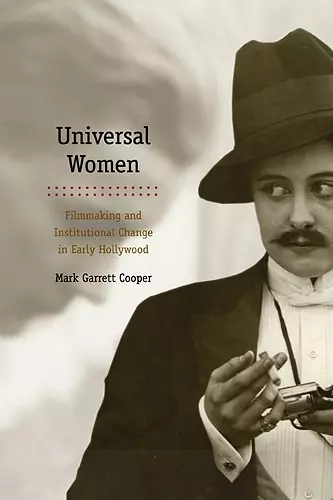Universal Women
Filmmaking and Institutional Change in Early Hollywood
Format:Paperback
Publisher:University of Illinois Press
Published:10th Mar '10
Currently unavailable, and unfortunately no date known when it will be back

An incisive analysis of the early film industry's support, then rejection of women directors
Between 1912 and 1919, the Universal Film Manufacturing Company credited eleven women with directing at least 170 films, but by the mid-1920s all of these directors had left Universal and only one was left. Focusing on issues of institutional change, this title challenges the interpretations that explain women's exile from the film industry.
A Choice Outstanding Academic Title, 2011.
Between 1912 and 1919, the Universal Film Manufacturing Company credited eleven women with directing at least 170 films, but by the mid-1920s all of these directors had left Universal and only one still worked in the film industry at all. Two generations of cinema historians have either overlooked or been stymied by the mystery of why Universal first systematically supported and promoted women directors and then abruptly reversed that policy.
In this trailblazing study, Mark Garrett Cooper approaches the phenomenon as a case study in how corporate movie studios interpret and act on institutional culture in deciding what it means to work as a man or woman. In focusing on issues of institutional change, Cooper challenges interpretations that explain women's exile from the film industry as the inevitable result of a transhistorical sexism or as an effect of a broadly cultural revision of gendered work roles. Drawing on a range of historical and sociological approaches to studying corporate institutions, Cooper examines the relationship between institutional organization and aesthetic conventions during the formative years when women filmmakers such as Ruth Ann Baldwin, Cleo Madison, Ruth Stonehouse, Elise Jane Wilson, and Ida May Park directed films for Universal.
A Choice Outstanding Academic Title, 2011.
"Meticulously researched and graced with numerous rare stills and frame enlargements, this is a superb, impassioned, detailed examination of how women flourished at Universal during the silent era and how it all came crashing down when the talkies began. Essential."--Choice"A meticulous and probing institutional history attuned to the hierarchies of gender. Cooper identifies a set of truly significant questions regarding the early access of women to directorial positions in silent cinema and the abrupt curtailment of that access."--Diane Negra, author of Off-White Hollywood: American Culture and Ethnic Female Stardom
"Deftly illuminates the intended and unintended consequences of institutional formation, change, and decision making at the dawn of the classical Hollywood studio system."--The Journal of American History"With rigorous focus, admirable economy, and wide-ranging research, Cooper outlines a sophisticated strategy for investigating how and why Universal Studios hired women as directors and then stopped doing so. This is the book we have been waiting for."--Kay Armatage, author of The Girl from God's Country: Nell Shipman and the Silent Cinema
"A stellar analysis of women filmmakers' rise and fall within the context of the Universal Film Manufacturing Company."--Enterprise & Society
ISBN: 9780252077005
Dimensions: 229mm x 152mm x 20mm
Weight: 426g
264 pages